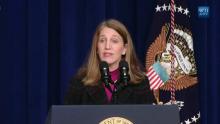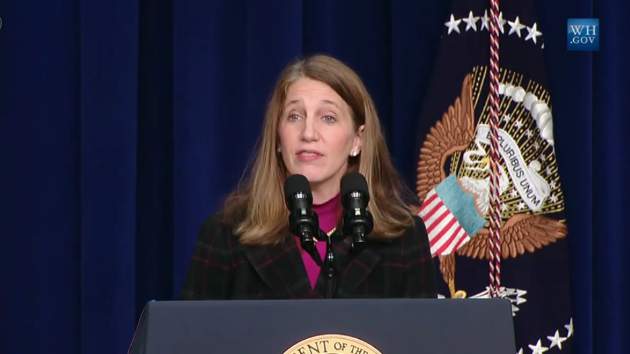User login
The federal government has launched the Health Care Payment Learning and Action Network as a way to help physicians and other players in the health care system transition to value-based medical care. The network was announced March 25 at a White House event.
“Health reform is really hard,” President Obama said at the event. “Everyone in the trenches knows that.”
In January, Sylvia M. Burwell, secretary of the Department of Health & Human Services, announced what the administration portrays as the next step in heath reform. Building on the cost-saving efforts of the health reform law’s accountable care organizations, HHS plans to shift at least a third of all Medicare payments away from fee-for-service to value-based payment models by 2016. By 2018, half of all Medicare payments are to be value based.
The Health Care Payment Learning and Action Network is intended to support those goals and give everyone a say in the process’s success, Secretary Burwell said at the briefing.
Specifically, the network will facilitate new care delivery models and the collection, analysis, and leverage of data from them; break down obstacles to care; create evidence-based quality metrics that do not create record-keeping burdens; and foster transparency in the health care system, according to the Centers for Medicare & Medicaid Services.
Over 2,800 partners have registered with the network, including physician organizations, insurers, accountable care organizations, hospitals and health systems, and patient advocacy groups, according to CMS.
At the briefing, Bruce Broussard, CEO of network partner Humana, said that the ACA’s focus on quality has “wrapped the focus around the journey of someone’s health. It’s really changing the system from a treatment-oriented one to a health-oriented one.”
Dr. Robert Wah, president of the American Medical Association, said that his organization joined the network because of the access to decision makers that participation is expected to give.
“It is critical that physicians take a proactive role in defining the details of new payment models, and this network will help facilitate that,” Dr. Wah said in an interview.
On Twitter @whitneymcknight
The federal government has launched the Health Care Payment Learning and Action Network as a way to help physicians and other players in the health care system transition to value-based medical care. The network was announced March 25 at a White House event.
“Health reform is really hard,” President Obama said at the event. “Everyone in the trenches knows that.”
In January, Sylvia M. Burwell, secretary of the Department of Health & Human Services, announced what the administration portrays as the next step in heath reform. Building on the cost-saving efforts of the health reform law’s accountable care organizations, HHS plans to shift at least a third of all Medicare payments away from fee-for-service to value-based payment models by 2016. By 2018, half of all Medicare payments are to be value based.
The Health Care Payment Learning and Action Network is intended to support those goals and give everyone a say in the process’s success, Secretary Burwell said at the briefing.
Specifically, the network will facilitate new care delivery models and the collection, analysis, and leverage of data from them; break down obstacles to care; create evidence-based quality metrics that do not create record-keeping burdens; and foster transparency in the health care system, according to the Centers for Medicare & Medicaid Services.
Over 2,800 partners have registered with the network, including physician organizations, insurers, accountable care organizations, hospitals and health systems, and patient advocacy groups, according to CMS.
At the briefing, Bruce Broussard, CEO of network partner Humana, said that the ACA’s focus on quality has “wrapped the focus around the journey of someone’s health. It’s really changing the system from a treatment-oriented one to a health-oriented one.”
Dr. Robert Wah, president of the American Medical Association, said that his organization joined the network because of the access to decision makers that participation is expected to give.
“It is critical that physicians take a proactive role in defining the details of new payment models, and this network will help facilitate that,” Dr. Wah said in an interview.
On Twitter @whitneymcknight
The federal government has launched the Health Care Payment Learning and Action Network as a way to help physicians and other players in the health care system transition to value-based medical care. The network was announced March 25 at a White House event.
“Health reform is really hard,” President Obama said at the event. “Everyone in the trenches knows that.”
In January, Sylvia M. Burwell, secretary of the Department of Health & Human Services, announced what the administration portrays as the next step in heath reform. Building on the cost-saving efforts of the health reform law’s accountable care organizations, HHS plans to shift at least a third of all Medicare payments away from fee-for-service to value-based payment models by 2016. By 2018, half of all Medicare payments are to be value based.
The Health Care Payment Learning and Action Network is intended to support those goals and give everyone a say in the process’s success, Secretary Burwell said at the briefing.
Specifically, the network will facilitate new care delivery models and the collection, analysis, and leverage of data from them; break down obstacles to care; create evidence-based quality metrics that do not create record-keeping burdens; and foster transparency in the health care system, according to the Centers for Medicare & Medicaid Services.
Over 2,800 partners have registered with the network, including physician organizations, insurers, accountable care organizations, hospitals and health systems, and patient advocacy groups, according to CMS.
At the briefing, Bruce Broussard, CEO of network partner Humana, said that the ACA’s focus on quality has “wrapped the focus around the journey of someone’s health. It’s really changing the system from a treatment-oriented one to a health-oriented one.”
Dr. Robert Wah, president of the American Medical Association, said that his organization joined the network because of the access to decision makers that participation is expected to give.
“It is critical that physicians take a proactive role in defining the details of new payment models, and this network will help facilitate that,” Dr. Wah said in an interview.
On Twitter @whitneymcknight
FROM A WHITE HOUSE PRESS BRIEFING

